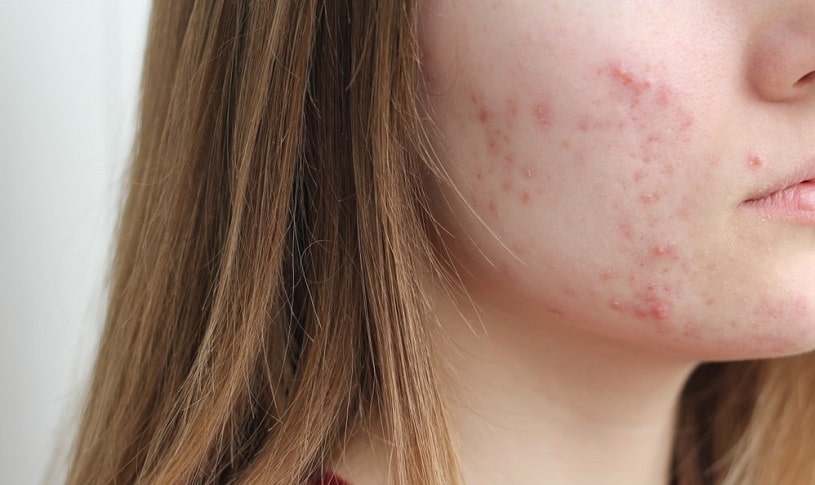Accutane (also known as isotretinoin or 13-cis-retinoic acid) is a potent medicine used by health personnel for the treatment of severe acne. It belongs to the class of drugs known as retinoids, which means it is chemically related to vitamin A. An important feature of this drug is that the Accutane half-life is relatively long. Therefore it remains in the body for an extended period after use. The isotretinoin mechanism of action is not fully understood, but it is believed to be strongly related to its ability to induce cell death in several types of cells, including the sebaceous glands located within the skin leading to several significant effects.
Table Of Contents:
So, how does Accutane work? How is it metabolized? And how long does accutane stay in your system?
How Does Accutane Work?
The question “how does Accutane work?” has long been a mystery about the poorly understood Accutane mechanism of action. Isotretinoin is popularly used in the treatment of severe acne and several other follicular conditions due to the ability of the Accutane mechanism of action to tackle the four major pathogenic processes involved in the formation of acne.
One of the most pronounced effects of the medication is its ability to induce cell death in the sebaceous glands located within the skin, therefore reducing the size and causing depression of the secretory ability of the glands. The medication also makes the cells sloughed off by the sebaceous glands less sticky and reduces their ability to form comedones.

Another important thing is the antimicrobial properties possessed by the drug since certain bacteria are believed to be major contributory factors in a significant number of cases of severe acne.
However, this medication has several significant and potentially severe health effects, and it is therefore not suitable for use in everyone.
Some of Them Include:
- It can cause birth defects when used during pregnancy or shortly before becoming pregnant.
- It can cause premature growth cessation when taken by young individuals who are still growing.
- Use of the drug is associated with permanent sexual dysfunction, such as reduced libido and erectile dysfunction.
- It may lead to anemia and abnormal platelet counts.
- It may lead to a significant rise in the cholesterol and triglyceride levels of individuals on the medication.
How Long Does Accutane Take to Work?
In most cases, it takes about 7 to 10 days for isotretinoin to start working, with most individuals noticing a significant improvement in their acne within 1 to 3 months of starting treatment. However, most people usually see a flare-up in their acne 2 to 3 weeks into the treatment. This is usually transient and mild but may sometimes require further treatment with antibiotics and steroids.
Accutane Metabolism Process
Isotretinoin can be administered orally and dermally. After oral administration, isotretinoin breaks down into three metabolites which bind to plasma proteins, primarily albumin. Isotretinoin and its metabolites are further metabolized into conjugates, which are then excreted in urine and feces.
How Long Does Accutane Stay in Your System?
This question is important and should direct one towards the next important aspect to consider during its use aside from the isotretinoin mechanism of action, the Accutane half-life. The Accutane half-life is 21 hours, and it takes approximately 4.8 days before it completely clears from the system according to standard Accutane blood test measurements.
However, the Following Estimations Suggest Isotretinoin Is Much More Persistent:
- Blood: Some data indicate that the substance exits the bloodstream after 15-24 hours as detected by an Accutane blood test.
- Skin: Since isotretinoin is applied directly to the skin, sebaceous glands under it may retain isotretinoin for six months.
Factors Affecting the Duration and Effectiveness
It is important to note that isotretinoin is not as effective in certain individuals as in others. It may be due to various factors such as the individual’s genetic makeup, how their body metabolizes the drug after taking it, and its duration within the body.
Factors That Affect the Duration of Isotretinoin in the Body and Its Effectiveness Are:
- Metabolic Rate: Slower metabolism rate slows down the entire process of isotretinoin elimination from the body.
- Body fat percentage: Fat accumulates isotretinoin and quickens its absorption, and “imprisons” it, thus making the excretion from the body slower.
- Taking isotretinoin with or right after meals: This leads to similar effects as the fat percent in the body and helps prevent an isotretinoin relapse.
- Hormonal dysfunction: In women with polycystic ovarian syndrome, isotretinoin absorption may slow down.
- The presence of certain bacteria: Bacteria like Staphylococcus aureus may affect the rate of excretion.
- Other drug interactions: If mixed with other drugs, isotretinoin absorption and the duration rate may differ. Salicylic acid and imidazole fungistatic may prolong isotretinoin’s presence in the body. Be sure to read any drug prescription guidelines carefully.
How To Safely Use Accutane
Despite the effectiveness of the medication in the treatment of severe acne, several important considerations must be taken into account before using it due to the potentially severe side effects of the medicine. Therefore, several investigations must be carried out before taking the drug.

Routinely these health checks include a blood test to check for triglycerides and cholesterol levels, kidney function, and liver function. For women, an immediate negative pregnancy test is also required before starting the medication or a negative pregnancy test taken within the last seven days due to its ability to cause congenital anomalies.
Also, using it in the treatment of acne in pubescent and prepubescent patients is contraindicated due to its ability to cause the premature fusion of long bones. Also, individuals should be screened for mental illnesses, previous adverse health reactions to the drug, conditions that cause dry skin, anemia, and so on.
Remember to always adhere to the instructions of the doctor while taking any medication. With the proper monitoring and when used on suitable patients, Accutane is an excellent drug for managing severe acne due to the benefits associated with the isotretinoin mechanism of action.
Hope Without Commitment
Find the best treatment options. Call our free and confidential helpline
Most private insurances accepted
Page Sources
- Brazzell, R. K., & Colburn, W. A. (1982). Pharmacokinetics of the retinoids isotretinoin and etretinate. A comparative review. Journal of the American Academy of Dermatology, 6(4 Pt 2 Suppl), 643–651.https://pubmed.ncbi.nlm.nih.gov/6461675/
- Choi, J. S., Koren, G., & Nulman, I. (2013). Pregnancy and isotretinoin therapy. CMAJ : Canadian Medical Association journal = journal de l'Association medicale canadienne, 185(5), 411–413. https://www.ncbi.nlm.nih.gov/pmc/articles/PMC3602257/
- Pile HD, Sadiq NM. Isotretinoin. [Updated 2020 May 16]. In: StatPearls [Internet]. Treasure Island (FL): StatPearls Publishing; 2021 Jan-. Available from: https://www.ncbi.nlm.nih.gov/books/NBK525949/
- Magin, P., Pond, D., & Smith, W. (2005). Isotretinoin, depression and suicide: a review of the evidence. The British journal of general practice : the journal of the Royal College of General Practitioners, 55(511), 134–138. https://www.ncbi.nlm.nih.gov/pmc/articles/PMC1463189/
- Tirado Sánchez, A., & León Dorantes, G. (2005). Disfunción eréctil durante el tratamiento con isotretinoína [Erectile dysfunction during isotretinoin therapy]. Actas urologicas espanolas, 29(10), 974–976. https://pubmed.ncbi.nlm.nih.gov/16447596/
- Lerman S. (1992). Ocular side effects of accutane therapy. Lens and eye toxicity research, 9(3-4), 429–438. https://pubmed.ncbi.nlm.nih.gov/1301795/




